
Subtext E-Newsletter Fall 2016

Welcome from Department Chair Maria Bullón-Fernández
By Maria Bullón-Fernández, Chair 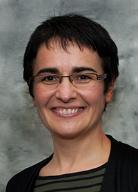
We hope our current issue of Subtext finds you well. We also hope you are reading and/or writing some good books. I was fortunate to be on sabbatical last year and had the opportunity to do research in my field, late medieval literature, and read many books, medieval and non-medieval, on my reading list.
While I was on sabbatical, the department was in good hands—Dr. Charles Tung was Acting Chair—and we have some exciting news to tell you about as well as some reflections to share with you. Let me start with the good news. The department conducted a search for a new Film Studies Director last year and we had the good fortune to hire Dr. Kirsten Thompson, a Professor of Film Studies who has previously directed Film Studies programs at Wayne State University and the University of Victoria in New Zealand. We are looking forward to Dr. Thompson growing and developing what is still a relatively new program. Two of our faculty received well-deserved College Awards: Dr. Christina Roberts received the College Teaching Award and Dr. Kate Koppelman the College Service Award.
We also want to share with you a new, exciting venture spearheaded by Dr. Molly Clark Hillard and in collaboration with our new Writing Studies program, the Dean of Arts and Sciences, the Office of Sponsored Research Programs, the University Core, and the Provost. This year we are launching SUURJ, the Seattle University Undergraduate Research Journal. SUURJ is an online peer-reviewed publication that will give undergraduate students on our campus the opportunity to publish their work. With Dr. Hillard as the faculty lead, the editorial board is composed of both faculty advisors and undergraduates who will gain valuable editorial experience. For more information about SUURJ, go to: https://scholarworks.seattleu.edu/suurj/
We have some great student and alumni news as well, as you will see when you read on. We would love to hear from you, too. Our current students are eager to learn about the many career options they will have as English and English/Creative Writing grads and you can help them imagine what opportunities there are. We have a link on our website, Our Alumni at Work, where we can feature you, our alums, and the different careers and jobs you have chosen. Please drop us a line at english@seattleu.edu, if you’d like to tell your story to our students.
Let me turn now to the reflections. You may have heard about last Spring’s student sit-in at Matteo Ricci College. The sit-in was about several issues, but students brought to light some serious concerns about justice, equity, and inclusivity in their education. The sit-in has led our whole campus community to engage in some needed discussions about inclusivity, equity, how we reach an increasingly diverse student population, and how we help our students navigate our current national context of public discussions and serious conflicts about race, gender, and sexuality. Our department has done significant work in this area in the past, but we are aware that we need to do more—and we are doing more. This year we are conducting a search for a Creative Writing tenure-track professor with a specialty in multicultural narratives; we are also engaged in faculty conversations about race and revising our curriculum.
We know that English and the Humanities have much to contribute to these conversations. Two years ago I finished my words to you by writing about the importance of the Humanities and about the work we are doing in the department to communicate with our students and the public about the role the Humanities play in education as well as in the public place. Let me finish this time by sounding this theme somewhat differently: the issues raised by the MRC Coalition about race, gender, and discrimination make it evident, I believe, that we need more, not less Humanities, and, especially, more, not less storytelling, whether through literature or film. For there are few better ways to discuss and understand the real costs and damage of racism, sexism, and other forms of discrimination on individuals and to reflect on the ways that we all may or may not participate in them than through stories. We hope you are expanding your world through reading books or watching films that challenge your perspectives and help you understand these hard issues and that you are working to contribute positively to these discussions from whatever subject position, identity, or identities you hold.
Department News
Author Ursula Le Guin Visits Campus
By Julia Campbell
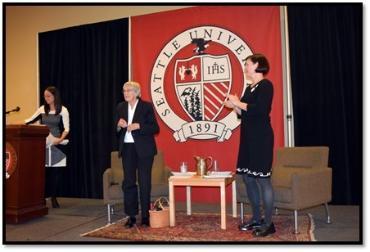 On October 28, 700 members of the Seattle University community gathered in Campion Ballroom to listen to acclaimed science fiction author Ursula Le Guin speak. Her novel, The Lathe of Heaven, served as the campus-wide Common Text for 2015—a program designed to provide an opportunity to practice active reading, share informed opinions, and discuss challenging ideas all while connecting new students with the Learning Communities on campus. Kate Koppelman, Associate Professor and Director of the University Core was the driving force behind bringing Le Guin to campus. Prior to the event, Dr. Koppelman worked extensively with Le Guin through email to prepare the best discussion points and questions to make the most of the reading. One of the bigger issues discussed was the challenge Le Guin faced as a female science fiction author, particularly in 1971 when the book was published. Le Guin credited the feminist movement of the 1960s and 1970s with giving her the courage to write as a woman. In addition, students were particularly interested in Le Guin’s view on how to change the world in the modern era, and how to combat climate change, to which Le Guin responded, “I don’t think anyone in my generation has any right to give younger generations advice on climate change.” When asked for advice on how to get started as a professional writer, Le Guin said, “It’s never been easy to be a writer, but you young people have it harder than I did,” because of the competition spawned by the digital age. She encouraged students to seek jobs that interested them, but also allowed them to support themselves: “You have to write,” she said, “but you also have to buy peanut butter.”
On October 28, 700 members of the Seattle University community gathered in Campion Ballroom to listen to acclaimed science fiction author Ursula Le Guin speak. Her novel, The Lathe of Heaven, served as the campus-wide Common Text for 2015—a program designed to provide an opportunity to practice active reading, share informed opinions, and discuss challenging ideas all while connecting new students with the Learning Communities on campus. Kate Koppelman, Associate Professor and Director of the University Core was the driving force behind bringing Le Guin to campus. Prior to the event, Dr. Koppelman worked extensively with Le Guin through email to prepare the best discussion points and questions to make the most of the reading. One of the bigger issues discussed was the challenge Le Guin faced as a female science fiction author, particularly in 1971 when the book was published. Le Guin credited the feminist movement of the 1960s and 1970s with giving her the courage to write as a woman. In addition, students were particularly interested in Le Guin’s view on how to change the world in the modern era, and how to combat climate change, to which Le Guin responded, “I don’t think anyone in my generation has any right to give younger generations advice on climate change.” When asked for advice on how to get started as a professional writer, Le Guin said, “It’s never been easy to be a writer, but you young people have it harder than I did,” because of the competition spawned by the digital age. She encouraged students to seek jobs that interested them, but also allowed them to support themselves: “You have to write,” she said, “but you also have to buy peanut butter.”
The event concluded with a standing ovation for Le Guin, and much anticipation for the 2016 Common Text, Octavia Butler’s novel Kindred.
Creative Writing Annual Update
By Dr. Susan Meyers
The Creative Writing Program is expanding its reach into some of the most cutting-edge literary focus areas—and the results are showing in our students’ success! The 2015-2016 academic year introduced two brand-new courses to our curriculum: “Multi-media Poetry” and “Genre Fiction.” Taught by our two Distinguished Visiting Writers, both courses were extremely well received, and we’ve been excited to see students’ follow-up work delving into new areas of poetry and prose. The first of these courses, “Multi-media Poetry,” taught by New York poet Deborah Poe, introduced students to a wide array of intersections between language and visual arts, from hand-stitched physical artifacts to a realm of digital language play. The second course, “Genre Fiction,” captured many students’ pre-existing interests in fantasy, science fiction, and related genres but kicked things up a notch by exploring the intersections among these and other, more speculative and avant garde influences. Taught by Kris Saknusseum, a prose writer who has written to national acclaim in so many different genres that he is impossible to pin down, the course introduced students both to genre conventions and innovations, and to the trends of the publishing industry.
A highlight of both the class and of SU’s creative writing speaker series last year was a visit from Amazon’s top editor, Chris Sclup, who generously gave students full insights into where publishing—both traditional and online—is headed. And clearly, students are listening! Within the past several months, a record number of students have been publishing their work. Recent successes include publications by Ashlan Runyan in The Boiler; Max Delsohn in Cutbank; and Scott Broker in American Chordata, CutBank, and Entropy.
In addition, we had two students, Bridget Estelle and Kristen McFadden, present their creative work at the NUCL conference in Portland this past spring. Both students also successfully completed their departmental honors thesis projects in creative writing. Finally, we continue to applaud several of our students who have recently been accepted to MFA programs—as well as Helen Packer (Creative Writing ’15), who received a 2016-2017 Fulbright to Korea!
Film Studies Welcomes New Director
By Julia Campbell
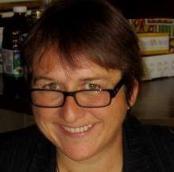
Dr. Kirsten Moana Thompson joined the faculty in fall of 2016 as the new Director of Film Studies. Dr. Thompson earned her M.A. in English Literature from Auckland University in New Zealand, and her PhD in Cinema Studies from New York University. Before coming to Seattle University, Dr. Thompson taught at Victoria University in New Zealand and Wayne State University in Detroit. She was excited to relocate from New Zealand to Seattle because of Seattle’s reputation as a progressive city in the Pacific Northwest. She was also drawn to Seattle University because of its scale, its mission of social justice, and its commitment to educating the whole person.
Dr. Thompson’s research spans from animation and color studies to New Zealand and Pacific film and visual culture. During her time at Victoria University, Dr. Thompson launched Victoria Visual Culture, an organization made up of 50 faculty members from different disciplines across campus who came together to discuss how visual culture interacts with their own work. Together, they ran three conferences, where faculty members and students alike were given an open forum to present research, papers, plays, and visual art. Dr. Thompson has already started forming a similar Visual Culture organization here in Seattle. It is her hope that this group will encourage people across Seattle University to start a dialogue with each other on the impact visual culture has on their own studies and research.
There are big and exciting changes coming to the Film Studies Department in the next few years. For the coming academic year, Dr. Thompson is introducing two new classes to the curriculum. These classes include History of Crime Film, which will study topics such as serial killers, couples on the run, and psychos, and Classic American Cel Animation, which will focus on older animation, such as Bugs Bunny and classic Disney films. She also plans to start a new film festival series, and wants to invite Pacific filmmakers Tusi Tamasese and Paul Wolffram to discuss their films with the students.
Dr. Thompson’s longer term plan includes a new curriculum, with a larger focus on production and specialized classes, such as sound design. She hopes to collaborate with the Theater Department for acting and production classes. In addition to these developments, Dr. Thompson also plans to partner with the Seattle Film Festival and the Northwest Film Forum.
Dr. Thompson is currently working on a new book, Color, American Animation and Visual Culture.
Departmental Honors
By Dr. Charles Tung, English Honors Coordinator
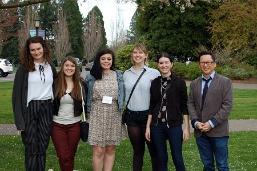 The English Department Honors Program is now in its fourteenth year. The high quality of our students’ work is the result of our strong curriculum and my colleagues’ excellent teaching at every level of our program.
The English Department Honors Program is now in its fourteenth year. The high quality of our students’ work is the result of our strong curriculum and my colleagues’ excellent teaching at every level of our program.
All five students of the 15-16 cohort presented their work at the University of Portland’s Northwest Undergraduate Conference on Literature (NUCL), which received record numbers of submissions this year, as well as at Seattle University’s Undergraduate Research Association conference (SUURA). Two of these students, Kasey Deems and Grace Goodwin, also presented work at the National Council for Undergraduate Research conference at the University of North Carolina, Asheville, which means they gave three presentations within the space of about 12 weeks!
Grace Goodwin received the 2015 NUCL Award for Best Critical Paper and a $50 gift card from Powell’s Books. Her essay, “The Liberation of Queerness: De-colonizing Time and Space in Ellison’s Invisible Man and King’s Green Grass, Running Water,” was written for Dr. Christina Roberts’s class.
The department is proud of all five excellent projects:
- Kasey Deems, “’We’re All Mad Here’: Mental Illness as Social Disruption in Alice’s Adventures in Wonderland” (mentor: Molly Clark Hillard)
- Bridget Estelle, “A Field for Weeds,” CW (mentor: Stephanie Lewis)
- Grace Goodwin, “’She did … feel what men felt’ / ‘He had become a woman’: Queer Temporality in Virginia Woolf’s Mrs. Dalloway and Orlando (mentor: Charles Tung)
- Kristen McFadden, “Girl Alone,” CW (mentor: Susan Meyers)
- Chloe Traynor, “Brutish Bodies & Transnarrative Media: Examining The Beetle as the Last Victorian Monster” (mentors: Molly Clark Hillard and Charles Tung)
Many past cohorts have gone on to do noteworthy things. If we haven’t heard from you, please notify us of your achievements!
Faculty Achievements
Molly Clark Hillard launched the Seattle University Undergraduate Research Journal (SUURJ), which will publish its inaugural issue in May of 2017. She has articles published or forthcoming in Boundary II, The Routledge Companion to Fairy-Tale Cultures and Media, and The Cambridge Companion to Charles Dickens. She is the chair of the Department’s Student Outreach Committee, and is also the Editor-in-Chief for Subtext.
Robert Cumbow contributed a tribute to actor John Ireland to the “O Canada” Blogathon in February. Later that same month he led a six-hour "Cinema Dissection" of Psycho at SIFF. His appreciation of Kathryn Bigelow’s Point Break will be published this July in the online magazine Slant’s “Summer of ’91” feature. In August, he will co-host an evening of Movie Trivia at the Women’s University Club of Seattle. He is spending the summer preparing the third iteration of his course in Horror Film (for Fall ’16) and a new course, The Films of David Lynch (for Winter ’17).
Bryn Gribben presented a paper, “Friends with Benefits: Sherlock, Millennial Viewers, and Sex,” at the 2016 Victorian Studies Association of the Western U.S. conference in Austin, Texas.
Nalini Iyer published Revisiting India’s Partition: New Essays on Memory, Culture, and Politics, co-edited with Amritjit Singh and Rahul K. Gairola. The book contains 19 essays that explore the long-term impacts of the Partition on South Asia and includes perspectives from the often-neglected voices of women, ethno-religious minorities, and other marginalized populations.
June Johnson Bube spoke on promoting institutional cross-program partnerships for working with multicultural and multilingual students at the Conference for Writing Program Administrators in Raleigh, North Carolina in July. With John Bean, she revised the Allyn and Bacon Guide to Writing (8th Ed). And with Kate Koppelman, she launched the Core Faculty Writing Fellowship Program to create a writing community across departments and colleges.
Kate Koppelman won the College Service Award in spring of 2016. She was also the driving force behind brining Ursula LeGuin to campus in fall of last year.
David Leigh published two articles in a new book Traditions of Eloquence: The Jesuits and Modern Rhetorical Studies. He also published a book review of the novel Submission, and presented two papers; one at the 18th Biennial Conference of the Society for Interdisciplinary Studies of Ultimate Meeting, and the other at the Western Regional Conference on Christianity and Religion.
Allison Machlis Meyer published an article, “Multiple Histories: Cultural Memory and the Case of Anne Boleyn in Actes and Monuments and Henry VIII,” in the 9.2 issue of Borrowers and Lenders: The Journal of Shakespeare and Appropriation, and a book review in the 97.4 issue of English Studies. Dr. Meyer contributed the paper, “Compiling Almansor in Early Modern Sammelband” to a seminar on the topic of Shakespeare and Race at the Shakespeare Association of America Annual Meeting, and presented “The Marriage that Conquered Spain: Palatinate Wedding Epithalamium in Early Modern Sammelband” at the Sixteenth-Century Society Conference. She served as a panelist for the Book Club of Washington and Seattle Public Library Special Collection’s First Folio Exhibit panel “Shakespeare in America,” moderated by Seattle University English majors Hannah Rips and Lilly Newell. With Dr. Jeffrey Todd Knight, Dr. Meyer co-organized and participated in a Shakespeare Scholar Lecture Series, “Shakespeare: Here and Now,” at the Seattle Public Library as part of their First Folio Exhibit. This spring, Dr. Meyer was also invited to deliver the keynote address “Pedagogy and Primary Sources: Reflections on Teaching Shakespeare in Context” for the Orbis/Cascade Alliance Teaching Primary Sources Symposium at Seattle Pacific University. She received a Provost’s Summer Faculty Fellowship and a Junior Faculty Professional Development Grant for 2016.
Susan Meyers was the 2nd place winner of the 2016 J.F. Powers Prize for Short Fiction for her story “Imagining Veronica.” She was also a visiting scholar at Universidad Iberoamericana in Mexico City in June of 2016. Lastly, she won a fellowship at the Brush Creek Arts Residency Center in Saratoga, Wyoming for August 2016.
Christina Roberts won a College Teaching Award in spring 2016. This fall, she will launch the Indigenous Peoples Institute with Father Patrick Twohy. You can read more about Dr. Roberts’ important work here.
Mary-Antoinette Smith had two articled accepted for publication: “Brontë’s Inferno: an Intertextual Structural Analysis of Edward Rochester’s Redemptive Fire Baptism” in Victorians: A Journal of Culture and Literature; and “Their Terra Incognita: Mapping Inner Geographics of Self in the New Woman Writings of the Fin de Siecle” in Liberating Herself: Emancipationist Writing at the Fin de Siecle for Cambridge Scholars Publishing. Both forthcoming in 2017.
Ben Stork published an essay in Film Criticism, titled “Aesthetics, Politics, and the Police Hermeneutic: Online Videos of Police Violence Beyond the Evidencing Function.”
Charles Tung spent 2015-16 serving as acting chair of the department and the coordinator of departmental honors. In the summer, he was invited to lead a seminar in post-war American literature for Study of the U.S. Institute for Scholars. Recently he’s been thinking a lot about temporal scale and published an article called “Baddest Modernism: the Scales and Lines of Inhuman Time” in Modernist Inhumanisms, a special issue of Modernism/ Modernity. He will present a paper on time-lapse aesthetics at Timescales: Ecological Temporalities Across Disciplines, a conference hosted by the Penn Program in the Environmental Humanities at the University of Pennsylvania in October. He’ll present another paper on race, anthropogenesis, and extinction at the next Modernist Studies Association, where he organized linked panels on the topic of “Race, Time, and Scale.”
Sean McDowell serves as President of the South-Central Renaissance Conference, one of the largest and oldest Renaissance societies in the U. S. In addition, he was elected to membership in the International Association of University Professors of English. During the past year, he presented four papers, all on seventeenth-century poets, at four international conferences. In April, the Seattle University Alumni Association gave Dr. McDowell the 2016 Distinguished Faculty Award. Dr. McDowell’s essay on “Urban Marvell” is forthcoming in The Oxford Handbook of Andrew Marvell, and he is under contract for an essay on “Donne, Heaney, and the Boldness of Love.” His poem, “Wind at Dùn Aonghasa,” was published in Scintilla: A Journal of Literary Criticism, Prose, and New Poetry in the Metaphysical Tradition. Volume 33 of the John Donne Journal, the first volume to be published under Dr. McDowell’s editorship, is due out in mid-November.
Student Achievements
Garth Ball (junior) and Brendan Kehoe (senior) are 2016-17 Naef Scholarship recipients. Brendan is a returning Naef Scholar.
Will Green has had a busy year. He spent spring break writing and finishing the first draft of his 90-page feature film script titled Apart. He has been selling his soul along with the script in order to get people to read it and provide feedback, improvements, and ideas for a second draft. He also became a full-time volunteer for Seattle Theater Group (STG) and ushers for their shows and gives free tours at the Paramount, Moore, and Neptune theaters. He had his first true acting debut for the narrative filmmaking students in two shorts called Battle in Seattle and Indie Woods. Lastly, he visited the New Orleans Jazz and Heritage festival and created compilation videos of several bands.
Jamie Wipf graduated with a double major in English and Theology/Comparative Religion. She is the recipient of an academic award from the Department of Theology & Religious Studies, as well as a Naef Scholar and a graduate of the University Honors Program. During her senior year, she studied abroad in Viña del Mar, Chile, before serving as a student leader for the IgnatianQ conference, which drew 140 students from across the country and won SU's Best Event Award. She also interned for Image Journal and the Institute for Catholic Thought and Culture, helping to host campus visits from local artists and from Dana Gioia, the Poet Laureate of California.
Alumni Achievements
Shannon Miller, class of 2015, was recently hired as assistant editor of a magazine, Vegas Seven, in Las Vegas, NV.
Vincent Chien, class of 2016, had his NCUR paper published in the Proceedings of NCUR 2015, "'Keep Them at Arm’s Length': Relationships between Homosociality and Power in Anthills of the Savannah." Vincent’s work was selected last year (when he was a junior), so he has now published in the NCUR journal two years in a row.
Annie Gala, class of 2016, has been accepted into Georgetown’s MA program in literature.
Helen Packer, English/Creative Writing and Humanities double major and 2015 graduate, received a Fulbright English Teaching Assistant scholarship and will do her Fulbright year in South Korea.
Amanda Westby Lybeck, 2015, Honors mentor Dave Leigh, is entering the MFA program at UW Bothell.
Danielle Poppo, 2014, Honors mentor John Bean, is entering a PhD in Rhetoric and Composition at U Mass Amherst.
Joe Kirk, 2014, Honors mentor Larry Nichols, was accepted into the MFA at Sarah Lawrence and the New School, but decided to wait and apply again next year.
Lindsey Walker, 2014, Honors mentor Sharon Cumberland, has landed a job as a travel writer and spent 10 weeks this summer in Hawaii. Next stops: Hong Kong, Bali, Rome, and Tokyo!
Aubrey Eyre, 2013, Honors mentor Mary-Antoinette Smith, got into Georgetown U’s Communication, Culture, and Technology MA and American U’s Public Anthropology program, but accepted a place in the MSc in Social Anthropology at the University of Oxford.
Andrew Battaglia, 2012, mentor Charles Tung, was accepted into the PhD at UW, UVA, U Chicago, and Rice. He chose Rice, where he received full funding.
Jessica Silbaugh-Cowdin, English minor, 2011, has been working with Rob Aguirre. She was accepted to several English M.A. programs, but chose a fully-funded offer from Oregon State University.
Featured Alumna
Olivia Hernandez, '12
By Julia Campbell
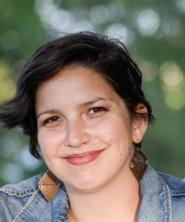
Olivia Hernandez has plenty to look forward to in the coming year. She completed her Master’s degree at the University of Washington in 2015 and is preparing for her readings for her PhD. Her goal is to become a professor at a community college teaching literature and composition. She’s also engaged to a fellow Seattle University English Department alum and plans to be married in August 2017.
Now, four years since her graduation from Seattle University, Olivia looks back on her time in the English Department and at the University fondly. “Seattle University is the only college I applied to. I really fell in love with the campus and connected with the social justice oriented world view of the professors.” She chose English as her major as a way to develop her writing skills, and credits Dr. Tung’s and Dr. Roberts’ classes for awakening her passion for literature. “[Dr. Roberts] classes were so incredible and…I’m so grateful I had that opportunity.”
Olivia also says her experiences with the classes and faculty inspired her to pursue teaching. Her PhD studies were a mixture of composition and literature, and she is interested in using literature to support writing pedagogy, rather than thinking of them as separate topics. It is her goal to combine literature and composition into her own curriculum. “I think that the quality of faculty in the English Department at SU really prepared me for being a teacher. I’ve tried…to project that in my own classroom, whether [through my] assignments or ways of framing readings or engaging students with a small classroom mentality.”
Her involvement with the Departmental Honors program her senior year solidified her future as a literature student and professor. “My senior year I got involved with the Honors program and it was incredibly crucial to everything I’m doing now.” She adds that the program changed her life and she would not have otherwise considered graduate school if she hadn’t done honors. Of her time at the University, Olivia says “it was such a special opportunity to engage with awesome professors for four years.”
Featured Student
Kasey Deems, '16
By Molly Clark Hillard
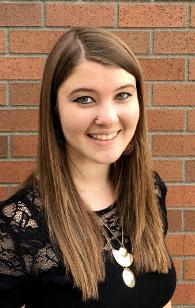 Kasey Deems is a double major in English and History. She says that both fields of study contribute to her next steps. Kasey’s dedication to disability studies permeates her academic and extracurricular work, and we think this focus and passion sets her apart as a student of note.
Kasey Deems is a double major in English and History. She says that both fields of study contribute to her next steps. Kasey’s dedication to disability studies permeates her academic and extracurricular work, and we think this focus and passion sets her apart as a student of note.
Kasey is using the quarter before she graduates to study Latin and complete an independent study in manuscript paleography [the study of ancient writing systems and the deciphering and dating of historical manuscripts] with History professor Dr. Theresa Earenfight. Kasey’s ultimate goal is to be accepted to a graduate program in Medieval studies or Medieval history, either in the US or the UK.
When asked what she looks for in the manuscripts she studies, she explains, “I work with original primary sources to examine the language of disability. I want to know what kinds of disability gained sympathy or were otherwise accepted in Medieval communities, and what kinds were the targets of superstition—for instance, seen as demonic possession.” She says that her English degree—both literature and creative writing—becomes useful in reading archival materials. “Most of the previous work in this field is descriptive rather than analytical. As an English double major, I can really focus on the analysis of language and bring more light to an underrepresented part of the field.” With her background as a creative writer, she says, “I hope to make my work fun to read as well as theoretical.”
Kasey had a busy 2015-2016 year in the English Department. As a member of the departmental honors cohort, she delivered three scholarly presentations in 12 weeks, and completed a successful honors thesis titled “’We’re All Mad Here’: Mental Illness as Social Disruption in Alice’s Adventures in Wonderland” under the direction of Dr. Molly Clark Hillard. She says that her work with departmental honors gave her the tools to apply a theoretical framework to her historical investigations, allowing her to talk about and theorize disability in provocative ways without being anachronistic.
Kasey is celebrated in the campus community for her advocacy work. She is a peer consultant and webmaster for the Writing Center. This summer, she worked with the Center to improve training for consultants on working with students with disabilities. Also this summer, Kasey had a paid internship with King County Metro. There, she researched the types of assistive technologies that people with disabilities use to ride Metro services. She also interviewed Metro employees to understand how well they understood assistive technologies, and how they saw client accessibility impacting their work.
In spite of all of her hard work this summer, Kasey says she got a much-needed break to go see the California Redwoods for the first time, when she went camping and hiking at Big Basin.
Upcoming Events
The following events are either hosted by the English Department, or organized in part by English Department faculty and/or students.
- The Indigenous Peoples Institute (IPI) will hold a public launch on November 12 at 11:30 a.m. in Casey Commons
- Fall quarter slam poetry, a student celebration, will take place on November 30 from 4:00-6:00 p.m. in Casey Commons
- Tod Marshall, Poet Laureate of Washington, will give a talk in winter quarter, date to be announced
- Leah DeVun, of Rutgers University, will give a lecture titled "The Medieval Hermaphrodite: Gender, Race, and the Boundaries of the Human in the Middle Ages" on May 11, at 4:00 p.m., in Wyckoff Auditorium
Subtext Editorial Team
Editor-in-Chief: Molly Clark Hillard
Managing Editor and Web Design: Julia Campbell
Send Us Your News
We’re counting on you to keep us informed! Send Subtext all of your exciting career, continuing education, and other professional developments, and we will feature them in our next installment. Your news is our pride!
Stay Connected
The English Department at Seattle University offers majors in English, English/Creative Writing, and Film Studies. Our faculty members are passionate about their teaching, scholarship, and creative endeavors. To learn more about our Department, we invite you to visit our website. For those who are interested in re-engaging with the Department as either a volunteer or a donor, or if you would like to make a donation in honor of your favorite professor, please contact our Director of Development, Katie Chapman at chapmank@seattleu.edu.